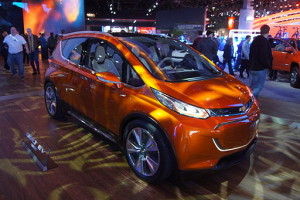 The Nissan Leaf and Chevrolet Volt entered the plug-in vehicle market almost six years ago, and other cars have followed suit while others are yet to enter the market. According to the current alternative energy cars’ list published in HybridCars.com, the total number of battery electric cars is 12, while hybrid electric cars are 11. The numbers are slightly differed from those reported last year where there were 9 plug-in electric cars and 13 battery electric cars. The current market share for plug-in hybrid electric cars is approximately 0.24% in comparison to last year’s 0.34%. Battery electric cars current market share is 0.41% while for the previous year was 0.39%.
The Nissan Leaf and Chevrolet Volt entered the plug-in vehicle market almost six years ago, and other cars have followed suit while others are yet to enter the market. According to the current alternative energy cars’ list published in HybridCars.com, the total number of battery electric cars is 12, while hybrid electric cars are 11. The numbers are slightly differed from those reported last year where there were 9 plug-in electric cars and 13 battery electric cars. The current market share for plug-in hybrid electric cars is approximately 0.24% in comparison to last year’s 0.34%. Battery electric cars current market share is 0.41% while for the previous year was 0.39%.
One of the vehicles to expect this coming year is Kia’s 2016 Optima plug-in, which has some clear similarities to Hyundai’s Sonata plug-in. It is basically, a plug-in form of the recently redesigned Kia Optima hybrid. Kia’s Optima plug-in car’s battery is the same as that of Hyundai’s and has a capacity of 9.8 kwh. This implies that its electric vehicle range of 27 miles is the second highest. This vehicle has been said to enter the market mid next year to aim towards Kia’s plan of becoming one of the leading manufacturers of hydrogen fuel, plug-in hybrid and hybrid cars. Its powertrain of 2.0 liters is also similar to Hyundai’s.
2017’s Chevrolet Bolt is another vehicle to expect this coming year. This vehicle will have a range of about 200 miles and its price will be around 30,000 dollars. The price of this vehicle coupled with its specifications makes it a significant plug-in vehicle to look forward to. To address the issue of range, the Chevy Bolt gives a range that is two times that of other electric vehicles within the same price range. Its major competitor is Tesla Model S with 70 kwh. Bolt evidently presents a major leap forward, regardless of the fact that it may not be fully satisfactory to those demanding more. Automakers are using plug-in electrification as a way of improving the emission scores and mpg of their fleet. Some of the honorable mentions that are likely to enter this market include BMW’s 3 and 7 series, Audi’s A4 plug-in hybrid electric car, Volkswagen’s Passat and Mercedes’ E-Class. Although Ford is already through with the production of its Fusion Energi, it has announced its intention to release the plug-in hybrid car’s next generation. Tesla’s Model X is also worth mentioning, with bulk deliveries expect to begin in 2016.